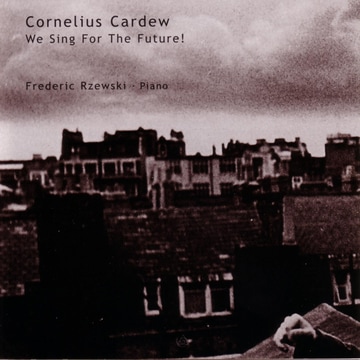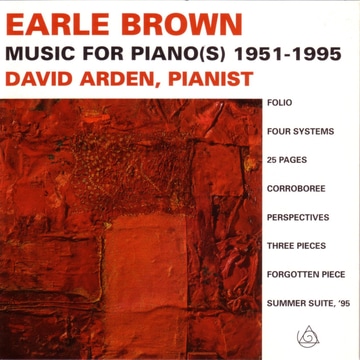|
We Sing For The Future!
Frederic Rzewski, piano Twenty years on, Cardew's music still provokes controversy. Even amongst his many admirers, his later 'political' music in particular creates unease and perhaps misgivings. The relation of the music to its 'programme' and to the lofty aims it purports to serve is problematic enough, so let us remind ourselves what Cardew himself wrote about this music in the seventies: "I have discontinued composing music in an avant-garde idiom for a number of reasons: the exclusiveness of the avant-garde, its fragmentation, its indifference to the real situation in the world today, its individualistic outlook and not least its class character (the other characteristics are virtually products of this). We Sing For The Future is a composition based on a song. The song is for youth, who face bleak prospects in a world dominated by imperialism, and whose aspirations can only be realized through the victory of revolution and socialism. In the framework of a solo piano piece lasting about 12 minutes, something of this great struggle is conveyed. The music is not programmatic, but relies on the fact that music has meaning and can be understood quite straightforwardly as part of the fabric of what is going on in the world. "I wrote the Thälmann Variations in 1974 to mark the 30th anniversary of the death of Ernst Thälmann, Secretary of the German Communist Party from 1927. In 1933 he was imprisoned by the Nazis and in 1944 he was executed in Buchenwald concentration camp. The theme of the variations is the Thälmann Song (1934) which is still popular today in the German Workers' movement. The variations are grouped into three large sections." Clearly, by announcing his political agenda Cardew's intention was to raise the stakes. In all his work, ethical, ‘extra-musical’ considerations were put to the fore; these were the standards by which his music was to be judged and were at the root of the fundamental changes in his music-making in the seventies. More mundanely, his musical options were a consequence of what he perceived as political necessity, i.e., the imperatives of the Party Line. Rzewski's interpretations of these two works are wholly admirable, the performances compelling, and the two improvisations towards the conclusion of We Sing For The Future -- an unexpected bonus -- are quite magnificent. He stretches the boundaries of style and musical language drawn up by Cardew without rupturing them, and, at the end of the improvisations, Cardew's music is ushered back, seamlessly and convincingly. In the second improvisation we are reminded of the great Bach/Liszt transcriptions; there can be no higher praise. Cardew would certainly have approved the inclusion of the improvisations and would have relished the verve and boldness of Rzewski's playing. —from the notes by John Tilbury Available here: iTunes HDtracks Music for Piano(s) 1951-1995
David Arden, piano Un disque qui s'impose. Rating: 10 --Répertoire This recording traverses the last forty-five years of Earle Brown's creative work, chronologically encompassing this twelve-tone "Three Pieces" and "Perspectives", his revolutionary "Folio" pieces, "25 Pages" (music's first truly open-form work), the multi-timbral "Four Systems" and "Corroboree", and the world premiere of his "Summer Suite '95", written especially for David Arden. These were recording sessions we would never forget. We were capturing revolutionary works, repertoire staples, never-performed works, never-recorded works and newly-written works, all brought to life at the hands of a brilliant performer. Time and again, we would be rendered breathless by the magic of what was coming over the speakers, and our sober audio booth would glow with an energy more powerful than all of us together. Before our ears, a legend was becoming sound. The music was at the same time vigorous and lyrical, audacious and beautiful, evocative and provocative. And if this appears to be a play of opposites, it is not surprising, since the man who created the music is no different. At 70, Earle Brown remains the broad-based, vital personage he has always been, a cultured Yankee spirit with a penchant for experimentation and an occasional bit of mischief, an incurable romantic with a child-like enthusiasm for almost everything. Here is a composer capable of both the strictest formality and the broadest liberty, a composer equally at home in serialism, aleatory forms, and triadic harmony. His creative output ranges from piano miniatures to multimedia works to big, sonorous orchestral pieces. This diversity may come as a revelation to many -- at least to those who believe that graphic works such as "December 1952" characterize Earle Brown's oeuvre. Perhaps this is to be expected, since it takes much less effort to pigeon-hole someone -- especially if they've done something revolutionary -- than it does to examine them in their entirety. The present recording hopes, in its own way, to help change this perception. --John Yaffé, Producer Available here: iTunes |
New Albion Records, Inc.Archives
October 2010
|


